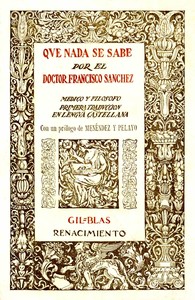Que nada se sabe by Francisco Sánchez
"Que nada se sabe" by Francisco Sánchez is a philosophical treatise written in the late 16th century. This work presents a skeptical inquiry into the nature and limits of human knowledge, positioning itself against established philosophical doctrines, particularly those of Aristotle. The author embarks on a personal exploration of knowledge and certitude, emphasizing the inadequacy of existing definitions and methodologies in philosophy. The opening of the text presents Sánchez discussing his motivations
for writing, reflecting on the futility of seeking absolute knowledge amidst conflicting opinions of various philosophers. He articulates a deep skepticism about the ability to truly define or know the essence of things, suggesting that many philosophical debates are merely verbal constructs that obfuscate rather than clarify understanding. He also proposes that true knowledge lies not in the silogisms and pedantic logic of his predecessors, but in a direct contemplation of nature and the empirical experiences one gathers throughout life, thus setting the stage for a radical critique of metaphysical claims and a call for a more grounded approach to learning. (This is an automatically generated summary.)
Read or download for free
| How to read | Url | Size | |||
|---|---|---|---|---|---|
| Read now! | https://www.gutenberg.org/ebooks/65937.html.images | 292 kB | |||
| EPUB3 (E-readers incl. Send-to-Kindle) | https://www.gutenberg.org/ebooks/65937.epub3.images | 1.1 MB | |||
| EPUB (older E-readers) | https://www.gutenberg.org/ebooks/65937.epub.images | 1.1 MB | |||
| EPUB (no images, older E-readers) | https://www.gutenberg.org/ebooks/65937.epub.noimages | 262 kB | |||
| Kindle | https://www.gutenberg.org/ebooks/65937.kf8.images | 1.2 MB | |||
| older Kindles | https://www.gutenberg.org/ebooks/65937.kindle.images | 1.1 MB | |||
| Plain Text UTF-8 | https://www.gutenberg.org/ebooks/65937.txt.utf-8 | 254 kB | |||
| Download HTML (zip) | https://www.gutenberg.org/cache/epub/65937/pg65937-h.zip | 1.1 MB | |||
| There may be more files related to this item. | |||||
Similar Books
About this eBook
| Author | Sánchez, Francisco, 1550?-1623? |
|---|---|
| Commentator | Menéndez y Pelayo, Marcelino, 1856-1912 |
| Uniform Title | Quod nihil scitur. Spanish |
| Title | Que nada se sabe |
| Credits | Ramón Pajares Box and the Online Distributed Proofreading Team at www.pgdp.net. (This file was produced from images generously made available by Biblioteca Digital Hispánica/Biblioteca Nacional de España.) |
| Reading Level | Reading ease score: 58.7 (10th to 12th grade). Somewhat difficult to read. |
| Language | Spanish |
| LoC Class | B: Philosophy, Psychology, Religion |
| Subject | Skepticism -- Early works to 1800 |
| Category | Text |
| EBook-No. | 65937 |
| Release Date | Jul 28, 2021 |
| Most Recently Updated | Oct 18, 2024 |
| Copyright Status | Public domain in the USA. |
| Downloads | 319 downloads in the last 30 days. |
| Project Gutenberg eBooks are always free! | |

